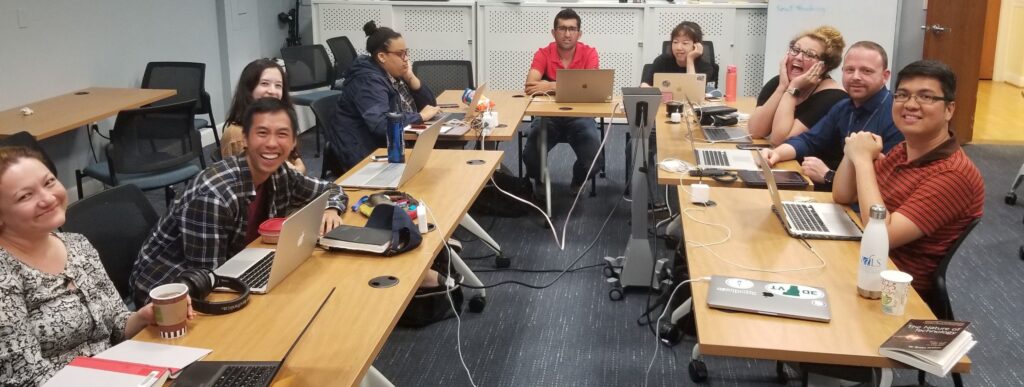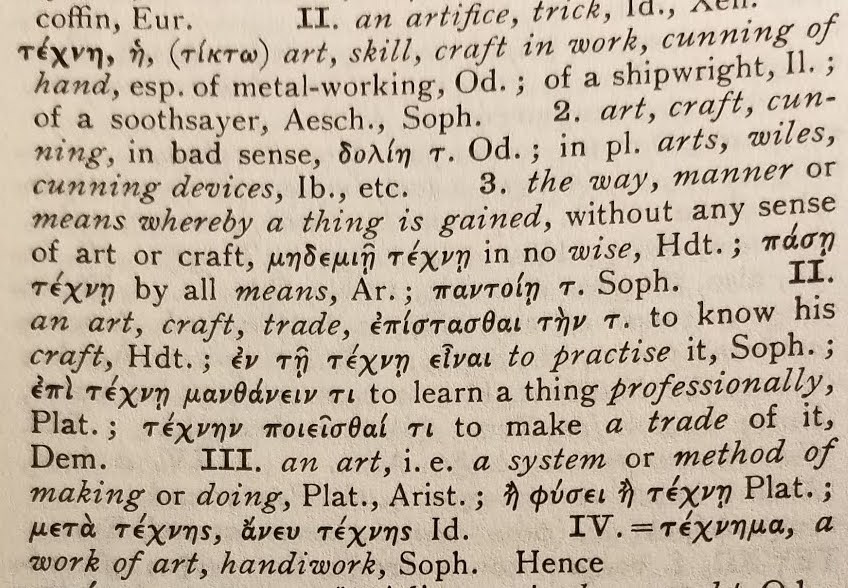Tonight is the first session of my technology, innovation, and design seminar for Georgetown University’s Learning, Design, and Technology masters program. This seminar is required for all LDT students, so the class tends to be among the largest.
As usual for me, I like to share my teaching practice through this blog: its plans, hopes, crushing realities, and great student work.
The idea of the class is to take a deep dive into the many ways we understand technology. It’s interdisciplinary, involving approaches from sociology, history, feminism, critical race theory, business, medicine, philosophy, critical theory, Middle Eastern studies, gaming, and literature.
Students will do a good amount of work. I’ve got them down for weekly discussion board responses, one tech presentation each, a mid term bibliography, and a final paper/project, not to mention live discussions. I’ve also added a glossary of terms, which they get to collectively develop, wiki-style.

Students from 2019’s iteration.
I’ve only taught the class once before. So I’ve kept what I thought worked best (topics, assignments, readings) and have added new stuff. It feels more history-heavy than last time, which is intentional, as I wanted to increase that dosage.
I’m excited about teaching a Reacting to the Past game. I’m still trying to get materials, but the game will probably focus on either the Luddites or early radio policy.
I’m recommending they watch some of these movies, but didn’t manage to require them.
Readings
- Ruha Benjamin, Race After Technology: Abolitionist Tools for the New Jim Code.
- Jon Gernter, The Idea Factory: Bell Labs and the Great Age of American Innovation.
- Steven Johnson, How We Got to Now: Six Innovations That Made The Modern World.
- Everett M. Rogers, Diffusion of Innovations, 5th Edition.
- Reacting to the Past game – TBA
- Mohamed Zayani, ed., Digital Middle East State and Society in the Information Age .
Recommended texts:
- James Bridle, New Dark Age: Technology and the End of the Future.
- Charles Fadel, Wayne Holmes, Maya Bialik, Artificial Intelligence In Education: Promises and Implications for Teaching and Learning.
- James E McClellan and Harold Dorn, Science and Technology in World History, third edition.
- Carlota Perez, Technological Revolutions and Financial Capital: The Dynamics of Bubbles and Golden Ages
- Alex Roland, War and Technology: A Very Short Introduction (Oxford University Press)
- Shoshana Zuboff, Surveillance Capitalism: The Fight for a Human Future at the New Frontier of Power.
September 1
Topic: Introductions
Readings:

Exercises:
- Glossary of key terms
- Signing up for tech presentations
September 8
Topic: the history of technology
- Reading: How We Got To Now 1
Student tech presentation
September 15
Topic: the history of technology
- Reading: How We Got To Now 2
Student tech presentation
September 22
Topic: Imagining innovation
Readings:
- Forster, “The Machine Stops” (http://archive.ncsa.illinois.edu/prajlich/forster.html (Links to an external site.))
- Bush, “As We May Think” (https://www.theatlantic.com/magazine/archive/1945/07/as-we-may-think/303881/ (Links to an external site.))
- Schroeder, “Noon in the Antilibrary” (https://www.technologyreview.com/s/611829/noon-in-the-antilibrary/ (Links to an external site.))
Student tech presentation
September 29
Topic: how innovations spread
- Readings: Everett M. Rogers, Diffusion of Innovations, 5th Edition: 1-52; 72-3; 87-218 (chapter 1; chapter 2 through the Miracle Rice story, the STOP AIDS story, and from “Opinion Leaders” on; chapters 3-5)
- Atul Gawande, “Slow Ideas” https://www.newyorker.com/magazine/2013/07/29/slow-ideas (Links to an external site.)
- Referenced: Moore, Crossing the Chasm
Student tech presentation
October 6
Topic: how innovations spread
- Reading: Everett M. Rogers, Diffusion of Innovations, 5th Edition 2
- Christensen, Raynor, McDonald, “What Is Disruptive Innovation?” https://hbr.org/2015/12/what-is-disruptive-innovation (Links to an external site.)
Student tech presentation
October 13
Topic: how to nurture innovation
Reading: Jon Gernter, The Idea Factory: Bell Labs and the Great Age of American Innovation (Selections)
Student tech presentation
October 20
Topic: Simulating technological possibilities: RTTP
Student tech presentation
October 23 – midterm project due
October 27
Topic: Justice and innovation, or Does technology have a politics?
Readings:
- Benjamin, Race After Technology: Abolitionist Tools for the New Jim Code, selections.
- Walter Benjamin, “The Work of Art in the Age of Mechanical Reproduction”
Student tech presentation
November 3
Topic: Justice and innovation, 2
Reading:
- Benjamin, Race After Technology: Abolitionist Tools for the New Jim Code, selections.
- Lepore, “The Disruption Machine” https://www.newyorker.com/magazine/2014/06/23/the-disruption-machine (Links to an external site.)
Student tech presentation
November 10
Topic: beyond the western world
- Reading: Digital Middle East, selections
Student tech presentation
November 17
Topic: technology among human beings
- Rosen, “Prologue” and “Changes in the Atmosphere” Prologue and Changes in the Atmosphere – Rosen v2.pdf
- Judy Wajcman, “Feminist Theories of Technology” Judy Wajcman Feminist theories of technology .pdf
- Martin Heidegger, “The Question Concerning Technology” Heidegger – The Question Concerning Technology.pdf
Student tech presentation
November 24 – no class; Thanksgiving holiday
December 1
Topic: futures
- Reading: TBD
- Presentations
December 12 – final project due





Hi Bryan,
Your course looks fantastic! Thanks for sharing. I have a question for you. I’ve been mulling over asking students and participants in our workshops this question: What are the problems you seek to solve? I am curious about what is on the minds of people regarding how they see the world’s urgent problems and how they see themselves in the solution. It may help those of us who work with people a chance to help them see how what they care about, what they do best, and how they meet the world where they are needed most.
Just some thoughts.
Bryan,
Please don’t gloss over an important facet of the diffusion of innovation — the “low-end” characteristic. Sure, bigger and broader markets come at a price — and so does cheapness have its price — quality always suffers. At least, initially.
Think of cell phones when they first came out — miserable in comparison with telephones, what we now call land lines. Lousy product, to being with.
LOW-END — it always starts out at the LOW-END of quality. Still is, LOW-END in many ways.
And, is there a guarantee that new product quality will always improve? No. There is no requirement inherent in innovation adoption for improvement, is there?
I wonder why ……..!
Glen, are you thinking of Christensen’s disruption thesis?
I am using “Low end” exactly as it is defined in the 2015 HBR article you posted — thanks for that!
Suggest you add “The Lab that ran away from Xerox” article FORTUNE, 1983 and the Xerox Technology Ventures HBS case. and John Kemeny’s (BASIC author)
Man and the Computer (1972)
Good-looking suggestions, Charles.
Didn’t Lucy Suchman write important work about Xerox early on?
https://en.wikipedia.org/wiki/Lucy_Suchman
This would have been before STS.
Yeah, Suchman worked at PARC for 22 years. Enjoy!
https://www.youtube.com/watch?v=cNJWafS-BA4